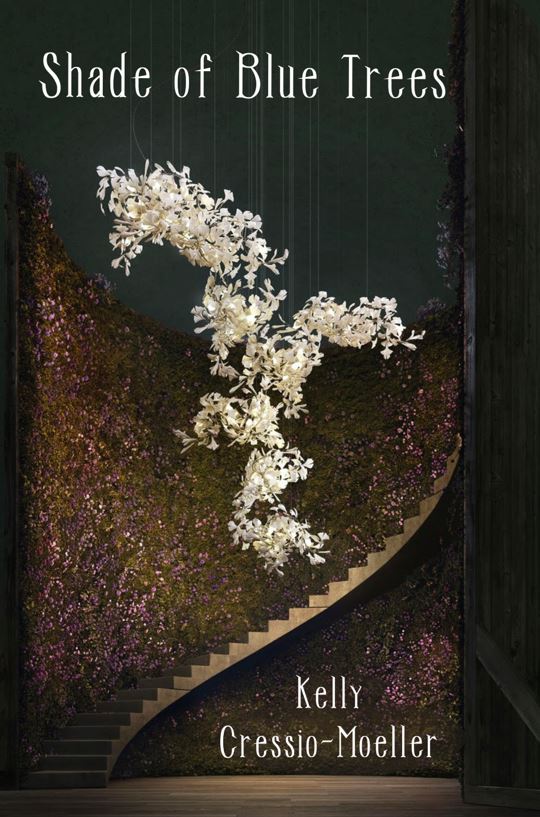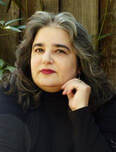Praise for Shade of Blue Trees (Finalist for the 2019 Two Sylvias Press Wilder Prize):
The poems of Kelly Cressio-Moeller’s Shade of Blue Trees offer up an intimate surrealism, earth-born, deeply shaded, and tinted the deep blue of solitude, memory, and myth, turning “yearning’s blue fire/into a dreamscape fugue.” Nowhere is Cressio-Moeller’s virtuosity more apparent than in the sequence of “panels.” These pieces function as lyric poems, language-paintings, fairy tales, and compressed novels, somehow removed from time, with a lushness that reminds me of Flaubert—without the meanness. For instance: “A wall-eyed jay cracks a cherry’s/skull against the cheekbone of dusk,” and “Cornflower satin, heels on parquetry—she orders/nests for her hair to keep skylarking near, wears the/clouds on her finger to be swallowed in vapor.” There are poems that walk the territory of the actual, from mother-loss, which winters the tips of the speaker’s hair, to embodiment: “without my cervix I am no less queen/open me, see there’s nothing left to give.” Indeed this collection is evidence of a queendom that has been cultivated via solitude, loss, and time. “For years,” she writes, “her poemwork involved dipping arrows/into tinctures of monkshood. Beneath her shawl of/suffering, she yearned only for two gifts: to be seen, to be understood.” With the unveiling of Shade of Blue Trees, those gifts have been delivered. --Diane Seuss
In Shade of Blue Trees, her astonishing debut collection, Kelly Cressio-Moeller weaves an intricate tapestry of imagery from the ferocity of grief, and the litany of disappearances we all inevitably bear, knowing every single moment something or someone is leaving. So much to praise in these resonant poems formed from the fissured bedrock of longing and sorrow: I wanted to drink a cup of winter . . . soft blades of mourning, with wry flashes of humor, this world is running out of virgins. There is nothing extraneous here, there is passion and wisdom, You taught me how not to live: all those years you were not dead but might as well have been. Each poem a hidden grotto to be re-visited, a quiet haunting in which we may take refuge. --Amber Coverdale Sumrall
In Kelly Cressio-Moeller’s debut collection, she escorts us deep into a melancholy forest, a place both familiar and mystical. Californians will recognize much of the terrain: cypress, pampas grass, black bears, rugged coastlines, and fog. Similarly, these moody poems capture our uneasy contemporary era, while reaching their roots deep into myth. Cressio-Moeller makes our burdens of loss and worry subjects of tenderly examined power (“shoulders that ride so high on worry / they mistake themselves for wings”). Buoyed by the enduring magic of the natural world, these poems pay somber respect to the extraordinary depth of our quotidian heartaches, and to the exquisite beauty and fragility of ordinary days. —Laura Cogan
The poems of Kelly Cressio-Moeller’s Shade of Blue Trees offer up an intimate surrealism, earth-born, deeply shaded, and tinted the deep blue of solitude, memory, and myth, turning “yearning’s blue fire/into a dreamscape fugue.” Nowhere is Cressio-Moeller’s virtuosity more apparent than in the sequence of “panels.” These pieces function as lyric poems, language-paintings, fairy tales, and compressed novels, somehow removed from time, with a lushness that reminds me of Flaubert—without the meanness. For instance: “A wall-eyed jay cracks a cherry’s/skull against the cheekbone of dusk,” and “Cornflower satin, heels on parquetry—she orders/nests for her hair to keep skylarking near, wears the/clouds on her finger to be swallowed in vapor.” There are poems that walk the territory of the actual, from mother-loss, which winters the tips of the speaker’s hair, to embodiment: “without my cervix I am no less queen/open me, see there’s nothing left to give.” Indeed this collection is evidence of a queendom that has been cultivated via solitude, loss, and time. “For years,” she writes, “her poemwork involved dipping arrows/into tinctures of monkshood. Beneath her shawl of/suffering, she yearned only for two gifts: to be seen, to be understood.” With the unveiling of Shade of Blue Trees, those gifts have been delivered. --Diane Seuss
In Shade of Blue Trees, her astonishing debut collection, Kelly Cressio-Moeller weaves an intricate tapestry of imagery from the ferocity of grief, and the litany of disappearances we all inevitably bear, knowing every single moment something or someone is leaving. So much to praise in these resonant poems formed from the fissured bedrock of longing and sorrow: I wanted to drink a cup of winter . . . soft blades of mourning, with wry flashes of humor, this world is running out of virgins. There is nothing extraneous here, there is passion and wisdom, You taught me how not to live: all those years you were not dead but might as well have been. Each poem a hidden grotto to be re-visited, a quiet haunting in which we may take refuge. --Amber Coverdale Sumrall
In Kelly Cressio-Moeller’s debut collection, she escorts us deep into a melancholy forest, a place both familiar and mystical. Californians will recognize much of the terrain: cypress, pampas grass, black bears, rugged coastlines, and fog. Similarly, these moody poems capture our uneasy contemporary era, while reaching their roots deep into myth. Cressio-Moeller makes our burdens of loss and worry subjects of tenderly examined power (“shoulders that ride so high on worry / they mistake themselves for wings”). Buoyed by the enduring magic of the natural world, these poems pay somber respect to the extraordinary depth of our quotidian heartaches, and to the exquisite beauty and fragility of ordinary days. —Laura Cogan
Sample Poem:
FIG TREE AT BIG SUR
Each day leaning
into morning,
five-fingered leaves
wave in unison,
beckon jays
for branch-play.
The youngest leaves
arch green faces upward,
devour sun off the Pacific.
The golden elders
bow closer to earth--
the perfect shape
for water to run
as rain, as fog
down to the root line.
When afternoon rays
light them just right,
they become a ring
of open palms
giving the last
of what they have.
FIG TREE AT BIG SUR
Each day leaning
into morning,
five-fingered leaves
wave in unison,
beckon jays
for branch-play.
The youngest leaves
arch green faces upward,
devour sun off the Pacific.
The golden elders
bow closer to earth--
the perfect shape
for water to run
as rain, as fog
down to the root line.
When afternoon rays
light them just right,
they become a ring
of open palms
giving the last
of what they have.


